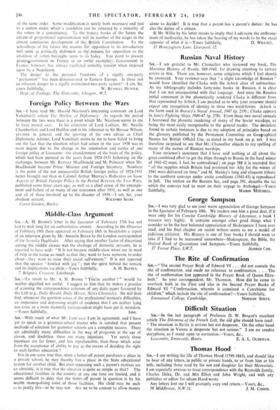Russian Naval History
Sia,—I am grateful to Mr. Chancellor who reviewed my book, The Maritime History of Russia, 848-1948, for drawing attention to certain errors in this. There are, however, some criticisms which I feel should be answered. Your reviewer says that "a slight knowledge of Russian" would have identified the- Chuka with the Schtch class of submarines. As my bibliography includes forty-nine books in Russian, it is clear that I am not unacquainted with that language. And since the Russian initial consonant in the phonetically rendered Chuka is different from that represented by Schtch, I am puzzled as to why your reviewer should expect any recognition of identity in these two word-forms. Schtch is the form used in Brassey's Naval Annual, 1947 (p. 219) ; Chuka appears in Jane's Fighting Ships, 1946-47 (p. 278). From these two naval annuals I borrowed the phonetic rendering of many of the Soviet warships, as being the most easily recognisable to the general reader. The deviation found in certain instances is due to my adoption of principles based on the glossary published by the Permanent Committee on Geographical Names for British Official Use, as stated in my book on p. xvi. I was therefore surprised to see that Mr,Chancellor objects to my spelling of many of the names of Russian warships.
Your reviewer's statement that I have said nothing at all about the great combined effort to get the ships through to Russia in the hard winter of 1941-42 must, I feel, be contradicted ; on page 388 it is recorded that "all the supplies which Britain had promised her Ally for the winter of 1941 were delivered on time," and M. Maisky's long and eloquent tribute to the northern convoys under arctic conditions (1941-43) is reproduced in pill. The section on the Barents Sea, and page 391, describe the ice which the convoys had to meet on their voyage to Archalgel.—Yours


































 Previous page
Previous page